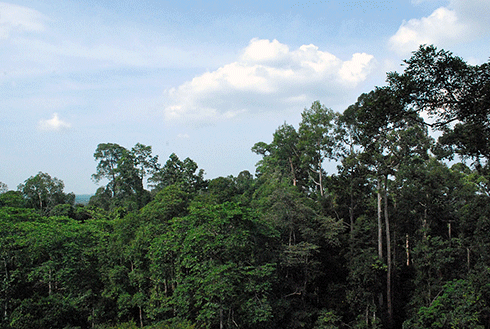
|
Published: 19 May 2014
Tree for tree, Borneo soaks up more CO2 than the Amazon
Scientists have discovered that the trees of Borneo’s tropical rainforest, which are being felled at an alarming rate, have a vital role to play in slowing down global warming.

|
|
Borneo’s forests are home to many dipterocarps, which grow at a faster rate and store more carbon than their tropical forest counterparts in the Amazon. Credit:
tian yake under CC BY-NC 2.0 licence
|
A research report published in the Journal of Ecology says that while the Amazon rainforest might be the biggest and most important area of green canopy on the planet, Borneo soaks up, tree for tree, more carbon from the atmosphere.
Lindsay Banin, an ecologist at the UK-based Centre for Ecology and Hydrology (CEU), and colleagues from Malaysia, Brunei, the US, Brazil, Taiwan, Peru and Ecuador investigated what is called above-ground wood production – the most visible, tangible indicator of carbon uptake – to see how forests in Amazonia and Indonesia measured up as consumers of atmospheric carbon.
‘In Borneo, dipterocarps – a family of large trees with winged seeds – produce wood more quickly than their neighbours,’ said Dr Banin, lead author of the CEU report. ‘This means that they have evolved something special and unique – and what this is exactly remains a mystery.
‘Dipterocarps are known to make special relationships with fungi in the soil, so they may be able to tap into scarce nutrient resources. Or they may be trading off growth of other plant parts.’
The researchers examined data from 17 plots in Amazonia and 11 in Borneo, with a total of 12,000 trees all of which have been monitored for more than two decades. On average, the South-East Asian plots grew 3.2 tons of wood per hectare more than the South American plots.
The research matters because climate scientists still have an uncertain picture of the future carbon cycle. Simulations of future temperatures depend on what happens to carbon dioxide emissions, and how vigorously the natural world responds to all that extra potential fertility.
Of concern is that Borneo has been losing its primal forest cover at an alarming rate. More than half of the lowland forests of Kalimantan – the equivalent of an area the size of Belgium were felled for timber between 1985 and 2001.
If trees in Borneo grow faster than anywhere else in the tropics, then any loss of those trees is likely to accelerate global warming.
The next step in the research is to try to figure out what Borneo has that Amazonia hasn’t.
Source: Tim Radford, Climate News Network



